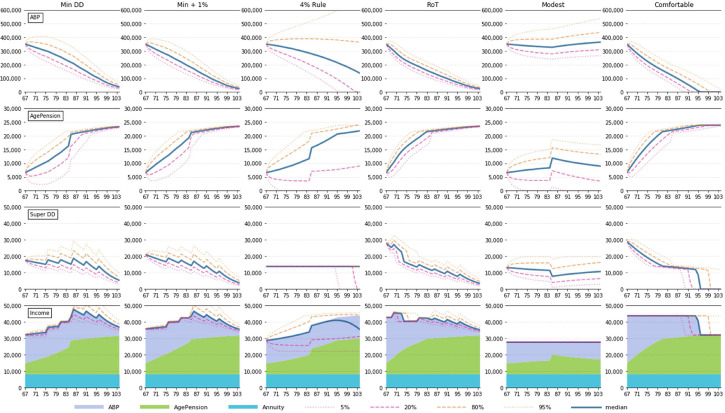
Commonwealth Scientific and Industrial Research Organisation (CSIRO)
CSIRO is Australia’s national science agency, solving the greatest challenges through innovative science and technology. CSIRO uses collaborative research to turn science into solutions for food security and quality; clean energy and resources; health and wellbeing; resilient and valuable environments; innovative industries; and a secure Australia and region.
CSIRO's chief aim is to improve the economic and social performance of industry, for the benefit of the community, and ACEMS/CSIRO collaborations foster projects with this focus.
CSIRO is a valued long-term partner of ACEMS. Our many and diverse engagements and collaborations over the years have helped advance the mathematical sciences and realise a positive impact.
2020 Overview
ACEMS had a very productive collaboration with CSIRO in 2020, engaging with over thirty CSIRO researchers (including CSIRO Partner Investigator and Associate Investigators) across diverse business units and platforms and with all ACEMS nodes. These engagements have afforded opportunities for: knowledge exchange; networking and relationship building; opportunity identification; new research collaborations and projects; mentoring of research students and early to mid-career researchers; professional development; cultural competence training; and access to and development of resources. Some of the key impacts in 2020 include:
- extending the frontiers of the quantitative sciences with important theoretical and methodological contributions to knowledge;
- supporting CSIRO’s mission-driven strategy to advance Australia’s recovery, resilience, and future prosperity, including with applied research to benefit industry and mitigate risks related to climate change;
- informing a number of CSIRO’s independent reports and recommendations to Government on key issues;
- impact in each of ACEMS Collaborative Domains, particularly in response to Australia’s devastating bushfires and the global COVID-19 pandemic;
- supporting, developing, and graduating new research talent, including co-supervised PhD students, promoting job opportunities, and participating in other mentoring initiatives;
- informing and contributing to the development of new data assets and data infrastructure, including in cooperation with the Australian Research Data Commons (ARDC); and
- contributions to cultural competence supported by CSIRO, including through the launch of “Our Knowledge Our Way” Best Practice guidelines for working with Indigenous knowledge, and peoples, in land and sea management guidelines.
2020 Highlights
Co-Supervision of PhD Students
In 2020, CSIRO has continued to sponsor and co-supervise ACEMS PhD students:
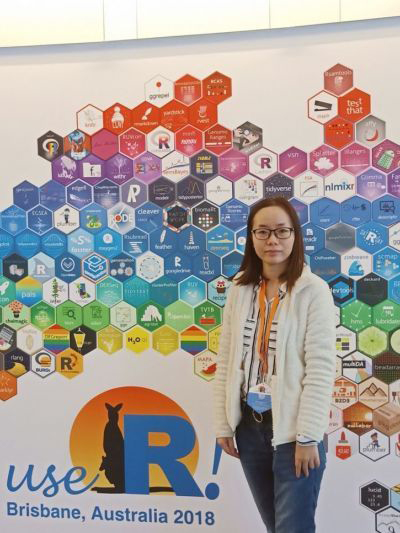
Shuwen Hu, whose research with CSIRO has helped to improve remote animal behaviour monitoring technology by increasing the accuracy of animal behaviour classification from sensor data using machine learning. Specifically, Shuwen’s research has identified the best performing machine learning method to use and a superior combined time window size approach, to capture the irregular duration of animal behaviours that occur both within and across behaviours.
Mohammad Davoudabadi whose carbon sequestration modelling work can improve the estimation and computation of carbon stocks to help enable more efficient and accurate decision-support for farmers and landowners, to help improve farm and land management practices for improved carbon sequestration and economic incentives. This should help reduce greenhouse gases linked to global warming, improve soil quality and increase crop productivity. Mohammad has been supported by an ACEMS QUT-CSIRO Digital Agriculture Scholarship and a CSIRO Digital Agriculture Top-Up Scholarship.
Collaborative Research Projects
ACEMS researchers collaborated with CSIRO on many significant research projects in 2020. Some of these projects are detailed in other sections (Case Studies, Research, Impact) of this report, with a list below as well as some highlights:
- Economic Scenario Generation (ESG) and Optimal Superannuation Life-Cycle Modelling and Risks
- COVID-19: Wastewater-based epidemiology to detect COVID-19
- Targeting Misinformation and Bot Behaviour on Social Media
- Identifying Pan-Genome Sequence Anchors Using Genetic Mapping and Machine Learning
- Water Modelling with Modern Strategies for Time Series Regression
- Statistical Methods and Models for Alzheimer’s Disease
- A stochastic model of jaguar abundance in the Peruvian Amazon under climate variation scenarios
- Research Theme: Modelling of Environmental and Climate Extremes
- High-dimensional inference using the extremal skew-t process
- Extreme Value Theory and Extremes
- Regionalisation Method for Rainfall Modelling
- Research Informing Bushfire Royal Commission and State Inquiries: Australian bushfire risk and anthropogenic climate change
- CSIRO’s Climate and Disaster Resilience Reports
- Combating Ecosystem Collapse from Australia to Antarctic
- Evaluating the Origin of a Species (Differentiating Homoploid Hybridisation from Ancestral Subdivision for the D Lineage in Wheat)
- CSIRO’s DiNeMo: Disease Networks and Mobility
Economic Scenario Generation (ESG) and Optimal Superannuation Life-Cycle Modelling and Risks
CSIRO Data61’s Peter Toscas leads a number of collaborative research projects including with ACEMS AI Bonsoo Koo who is involved in the above three year project that commenced in 2020. This follows on from a strong body of collaborative research in this area.
In 2020, ACEMS Monash AI Bonsoo Koo co-authored the papers with CSIRO collaborators from this group:
- “Using a stochastic economic scenario generator to analyse uncertain superannuation and retirement outcomes”, submitted to the Journal Annals of Actuarial Science (forthcoming), which provided an advanced tool to analyse the sustainability of popular drawdown strategies during retirement under the current pension and superannuation scheme; and
- “Personalised drawdown strategies and partial annuitisation to mitigate longevity risk” submitted to the Journal Financial Research Letters (forthcoming), which uses CSIRO’s multi-factor economic scenario generator, Simulation of Uncertainty for Pension Analysis (SUPA) model (for projecting financial and economic factors which directly impact income, investment returns and withdrawal patterns), toguide the selection of personalised drawdown strategies during retirement based on retirees’ financial profiles and their choices of annuitisation levels which impact retirement income and the remaining superannuation balance. The results supporting a conclusion that Retirement income choices need to factor in the complex interplay between lifestyle choices, desired income level, and annuitisation levels.
Researchers from CSIRO Data61, including ACEMS AI Mehwish Nasim (formerly at ACEMS University of Adelaide), and ACEMS University of Adelaide, are collaborating on research to harness social media data to: detect the activity of social bots (to distinguish between genuine conversations and bot-generated messages); predict major events and trends; and help target misinformation on social media networks.
This research has led to a number of outputs, including:
- an algorithm that detects social bot activity on Twitter in real-time, to help prevent the spread of misinformation and enable first responders to detect major events, using machine learning, artificial intelligence (AI) and natural language processing (NLP)
- a Pachinko Prediction Framework, as described in the publication “Pachinko Prediction: A Bayesian method for event prediction from social media data” published this year in the Journal Information Processing & Management
Learn more about the research
Graphs containing bots & human users. Source: CSIRO
Read the CSIRO article “How an algorithm could prevent the spread of misinformation and improve emergency response times”

Listen to ACEMS AIs Mehwish Nasim and Simon “Jono” Tuke talk about how their research is addressing the problem of misinformation on social media in this ACEMS Podcast
This research is relevant to a number of domains and industry partners, and supports related follow-on projects:
- Mewish Nasim and ACEMS researchers including AI Lewis Mitchell have also been collaborating on various grant proposals, including also with DST and for "modelling polarisation and radicalisation during a crisis”.
- ACEMS AI Lewis Mitchell and CI Matthew Roughan were also awarded an ARC discovery grant for new mathematical and statistical methods to understand information flow in social networks.
In 2020, CSIRO’s Alec Stephenson together with ACEMS AI Boris Beranger and CI Scott Sisson developed a new methodology for max-stable processes, incorporating the Stephenson-Tawn Concept invented by the CSIRO researcher. The collaborators’ new method was applied to a 90 dimensional temperate dataset and showed statistical and computational efficiency for higher-order composite likelihoods.
Learn more about extreme value statistics and extreme weather research
Watch this presentation by ACEMS UNSW Boris Beranger delivered at ACEMS Annual Retreat to learn more about:
- the analysis of extreme values
- some analysis challenges; and
- new ways to tackle these challenges, building on the work of research from CSIRO and other researchers
Read this research article entitled “High-dimensional inference using the extremal skew-t process” published in the scientific journal In Extremes.
Globally, the collapse of ecosystems imperils biodiversity and human health, livelihoods and lives.
CSIRO and ACEMS researchers were part of a transdisciplinary team awarded a National Science Foundation grant to investigate the state and trajectories of 19 ecosystems, from Australia’s coral reefs to terrestrial Antarctica, and help inform their management.
Researchers from CSIRO and ACEMS collaborating to avert ecosystems collapsing
Kate Helmstedt, ACEMS QUT AI

Josep G. Canadell, CSIRO Climate Science Centre; Executive Director of the Global Carbon Project
Jessica Melbourne-Thomas, CSIRO Oceans & Atmosphere; 2020 TAS Australian of the Year
Rowan Tebilco, CSIRO Oceans and Atmosphere; Team Leader, Ecosystem Modelling

Suzanne M. Prober, CSIRO Land and Water
Kristen J. Williams, Ecological geographer, CSIRO Land and Water
An output of their research entitled “Combating ecosystem collapse from the tropics to the Antarctic” was submitted to the Journal Global Change Biology in October 2020 (and has since been accepted for publication).
As detailed in their research publication, this research:
- mapped the location and different pressures (presses and pulses) of ecosystem change
- provided collapse profiles within ecosystems (abrupt, smooth, stepped and fluctuating)
- found evidence of ecosystem collapse across all 19 ecosystems (at a local level at least); and
- provided an assessment and management framework, the 3As Pathway: Awareness, Anticipation and Action, as a tool to aid strategic and effective mitigation to alleviate further degradation and related risks, since the research indicates that: early warning tools (e.g., vulnerability assessments and threat web analysis) can enhance anticipation; and actions should be directed at relatively health ecosystems or parts thereof.
Note: Since published in “Combating ecosystem collapse from the tropics to the Antarctic” by D. M. Bergstrom et al., 2021, Global Change Biology
The 3As Pathway. Awareness, Anticipation and Action pathway for guiding strategic and effective threat abatement and ecosystem management.
Source: Figure from the Research Article Difference in the inheritance patterns of shared variations between the B(A,D) model and the A(D)B model for the speciation of the diploid D lineage in wheat.
An international research team including CSIRO’s Yunfeng Jiang and ACEMS’ CI You-Gan Wang developed a new approach which allows the distinction, in evolutionary biology, between hybridisation and ancestral subdivision. They applied this approach to re-evaluate the origin of the D lineage of wheat.
Their research publication “Differentiating homoploid hybridization from ancestral subdivision in evaluating the origin of the D lineage in wheat”, published in the Journal New Phytologist, shows that this diploid D lineage is very unlikely to be the homoploid hybrid speciation (HHS) production between the other two wheat lineages.
Significantly, this collaborative research and its new statistical modelling have led to the debunking of earlier published research. The idea that the D lineage of wheat was originated from HHS between the ancient A and B lineages was initially published in Science (Marcussen et al. 2014). Subsequently, several additional papers have been published in high impact journals support the idea. However, these publications are based on sequence data only and they are not supported by biological evidence.
In 2020, ACEMS welcomed CSIRO’s Jess Liebig as an ACEMS Associate Investigator, to continue and extend collaborations with ACEMS members in the area of network science and modelling of disease spread.
Jess works in CSIRO’s Distributed Sensing Systems Group’s project DiNeMo: Disease Networks and Mobility, which explores how human infectious diseases found overseas might spread in Australia and overseas, and how these movements can be predicted. It has focused on diseases including Dengue Fever and with focus extending to COVID-19 in 2020.
As an ACEMS AI, Jess Liebig has:
- continued work developing a global model of COVID-19 as part of an international team with ACEMS CI Kerrie Mengersen and AI Chris Drovandi, which is also relevant to other work on modelling the spread of COVID-19, conducted across multiple ACEMS nodes including UoM and UQ
- engaged with ACEMS members across other areas of interest, including in the use of mobility data and improving a data asset, and range of statistical and mathematical projects related to building predictive models incorporating big data
- Prepared the co-authored publication “Identifying highly influential travellers for spreading disease on a public transport system, investigating the movement patterns and the physical encounters of individuals on public transit systems to better understand these drivers of infectious disease outbreaks, relevant to ACEMS research in “Hindsight is 2020 vision: a characterisation of the global response to the COVID-19 pandemic”, by an international team including ACEMS Research Fellow David Warne, AI Chris Drovandi and CI Kerrie Mengersen.
Engagement Highlights
CSIRO has engaged with ACEMS for a diversity of purposes, including knowledge exchange, supporting industry, and mentoring and development of ACEMS students and EMCRs. Highlight engagement activities organised by ACEMS are outlined below:
ACEMS COVID-19 workshop
CSIRO’s Sankalp Khanna and Petra Kuhnert (ACEMS PI) gave a presentation on the topic “Analytics to Support the COVID-19 Response”. The talk introduced a dashboard that has been developed to visualise and track reported COVID‐19 cases, deaths, trends and forecasts in Australia and across the world in near real‐time, while also providing some sophisticated analytics to support interpretation and meaningful comparison. Transmission, forecasting and surveillance models being developed to support the easing of restrictions were also discussed.
“I really enjoyed the knowledge sharing and collaboration” - Dr Sankalp Khanna (pictured left)
ACEMS Mentoring and Technical Talk
ACEMS hosted a mentoring workshop on the topic “Life Outside University”, with industry mentors aimed at highlighting career opportunities, pathways, and practices, outside universities, particularly for the benefit of ACEMS research students and early to mid-career researchers.
CSIRO Data61’s Emma Lawrence, a senior statistician working in applied statistics in the marine conservation domain, was a guest panellist at the mentoring talk. She shared her industry experience since graduating university, and her advice to researchers interested in working at CSIRO. She also spoke about the value of being able to work in multi-disciplinary teams and communicate statistical advice to policy-makers.


Co-hosted Data Science Workshop for Industry & Academia
CSIRO supported a Data Science Workshop for researchers and industry, co-hosted by ACEMS.
The workshop was aimed at exploring the latest research in data integration, data quality, data management, and visualisation, from researchers and CSIRO, as well as challenges and opportunities highlighted by industry guests from agriculture, health and Australia’s Space Agency.
AI Tomasz Bednarz (CSIRO Data61; Director, EpiCentre UNSW) presented on the topic “Visual Microscope on Big Data - Expanding Perception and Interaction through Visual Analytics Approaches”. Industry was particularly interested in the CSIRO/ACEMS capabilities and infrastructure for an agricultural industry supply chain digital twin, also integrating research knowledge shared by speakers at the workshop.
PhD student Shuwen Hu delivered a presentation of findings from her CSIRO-ACEMS supported PhD research. Shuwen discussed which method had been most accurate for classification, how accuracy was impacted by different time window sizes, and the most important features for certain behaviours.
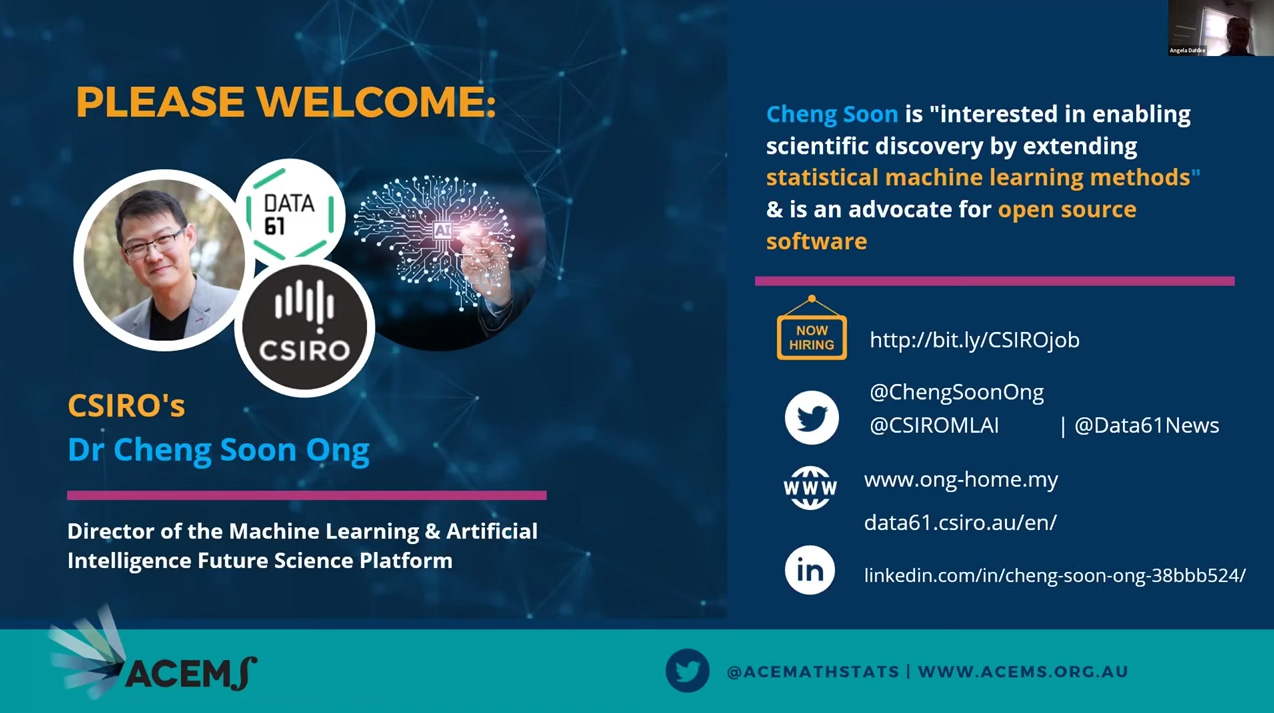
ACEMS Virtual Annual Retreat
In view of COVID-19, ACEMS adapted its Annual Retreat plans and went ahead with an Industry Partners day for ACEMS collaborators, including our CSIRO PI Petra Kuhnert and colleagues, to attend virtually.
CSIRO Data61’s Dr Cheng Soon Ong, delivered a presentation on “Machine Learning for Scientific Discovery”. He also discussed some key collaborative projects of interest to ACEMS members, involving bushfire and climate modelling and promoted opportunities within CSIRO.
Our Partner Investigator and Collaborators

We thank Partner Investigator, Petra Kuhnert for her immense contribution to the CSIRO ACEMS partnership (including her support of and participation in engagements and collaborations), since commencing as CSIRO’s new PI in 2019. Petra took on the role from Tomasz Bednarz who as an ACEMS Associate Investigator remains a valued collaborator in his roles at CSIRO Data61 and UNSW.
Opportunities for 2021
CSIRO and ACEMS have already committed strong support for collaborations extending beyond 2020, including with the commitment to co-fund two 3-year postdoctoral research positions that will be co-located at the ACEMS UNSW Data Science Hub and Data61, ongoing PhD supervisions, and multiple research visits across Australia. The Data Science Workshop identified opportunities for an industry-funded follow-up hackathon with Integrity Systems Company in 2021. CSIRO will also be invited to collaborate in the follow-up hackathon, and may provide supporting data and expertise.
